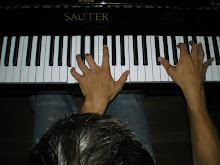Philip Glass said something wonderful in an interview i listened to recently- and it was advice to young composers. No matter what you think of his music (i dont always have the nicest things to say, either) the statements rung true for any composer, and more importantly, true for any artist.
young composers often ask him "how do you find your own voice?" and glass' reply came in the interview: "its not about finding a voice, but trying to get rid of it!" (or something to that effect) This holds true whether your a "neo-romantic" or a purely electronic artist, you will have a "style" already, even if its copying bach or beethoven, or varese and cage, you will have a manner of saying something, and the goal is not to do the same thing until it becomes trademark, but to rebel against yourself and your musical inclinations in order to develop a greater musical vocabulary and range. It seems that a degree of self-rebellion is probably the healthiest thing for a contemporary composer, but thats my speculation.
Ironically, Glass' music is often criticize for its terrible sameness- "it all sounds the same" kind of thing, and in the last 30 years how far has he deviated from his origins? not very far at all. His chord progressions can be horrifyingly hackneyed. "its the philip glass chord progression!" you might say to yourself when listening to anything he's written in the last 20 years. He seems to use it in all music after the mid 80s.... major on the tonic, chromatic shift down to minor, back to an inversion of the maj0r chord, then to the...what do you call it... arg, theory terminology slipping away from me, the "dominant" for the minor (i like to think of it as this, hopefully you know what the hell im talking about) and then back to the relative minor, and then back to the major on the tonic, and again and again and again. In only slight variations this appears in dozens of pieces and operas and on and on and on. Minimalism still exists- not in his music, but in his musical output as-a-whole.
Glass realizes this. He said in the interview that he's been trying to escape his own compositional processes, and when faced with the reality of the sameness of his output- "its humbling" he says..... I'd say. He openly admits that he's failed at escaping his style. I cant see how it would be that difficult, as a rather undisciplined musician, i'd comment that its probably the triumph of technique over imagination- which makes sense given his training under Boulanger.
I couldn’t help the criticism, i really couldn’t, but i have a lot of very nice things to say too, i swear. Either way, his commentary is still illuminating and i appreciate what he has to say.... i just wish i'd reflect more in his art.
Lahti
2 years ago

4 comments:
I don't like most of Philip Glass's music. Listen to his "Tirol concerto." It is almost literally nothing but the same chord progression arpeggiated a hundred different ways.
Although I understand that you're not just taking pot-shots, I think you're missing some of the point of Glass and other "not-Minimalists," that being there's more to music than harmony, and that we can be endlessly fascinated by very simple sounds spun together in new (or not new) ways.
I hope your music making goes well - keep an open mind and learn where you can, just as with this post!
- Sohanstag
I'm no musicologist, but to me the salient test of any music is: does it elicit emotion involuntarily/autonomously from the listener? On that score Glass's music not only works, but often passes with flying colors. As one commenter above suggested, an effective piece of music may be fashioned from very simple elements and with an unexpectedly large amount of repetition . . .
does it elicit emotion involuntarily/autonomously from the listener?
Yes. Phillip Glass's music elicits ecstasy from those who love it and shrieking pain for those who can't stand it. Yes...it elicits emotion. But then...the great composers elicit a variety of emotions. Unexpected emotions. The kind of emotions that come from hearing something new, different, varied, bold, unthinkable, innovative. There are so many possible patterns in music, so many notes to fashion a theme out of, so many avenues to explore. How long can you go on with the same chord progression mixing 4/4 beats with triplets and changing up the rhythm and instruments before there are no more or new emotions to elicit. God...the guy is clearly extremely talented...why can't he sit down at the piano and give us something totally out of the ball park?
Post a Comment